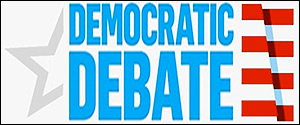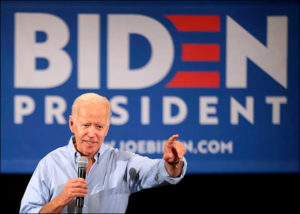By Jim Ellis
 Aug. 16, 2019 — It appears the Democratic National Committee’s move to increase the presidential debate qualifications in order to decrease the number of participants is working.
Aug. 16, 2019 — It appears the Democratic National Committee’s move to increase the presidential debate qualifications in order to decrease the number of participants is working.
With the first two debates featuring 20 candidates over a two-night process, party leaders obviously wanted to cull the field in order to attract a large viewership and host a more serious single forum. Thus, the debate qualifications were doubled in order to ensure that only the most competitive candidates would be included in the succeeding candidate events.
Originally, in order to earn a debate podium, the contenders had to recruit 65,000 donors or score at least one percent support within a series of designated polls. For the third debate scheduled over two days — Sept. 12-13 from Houston — the minimum qualification standards were doubled. Now, the candidates must prove they have at least 130,000 donors, 400 of whom come from at least 20 states, and receive two percent support on four of eight designated polls during the period of June 28 and Aug. 28.
At this point, nine candidates have already officially qualified for the September forum and three more have clinched one of the two platforms. Most of the nine were expected to earn their debate positions, but there is at least one major surprise, and some believe two minor ones.
| The next debate will feature no fewer than the following candidates (alphabetically listed): |
|---|
| • Former Vice President Joe Biden |
| • Sen. Cory Booker (NJ) |
| • Mayor Pete Buttigieg |
| • Sen. Kamala Harris (CA) |
| • Sen. Amy Klobuchar (MN) |
| • Ex-Rep. Beto O’Rourke (TX) |
| • Sen. Bernie Sanders (VT) |
| • Sen. Elizabeth Warren (MA) |
| • Businessman Andrew Yang |



 Aug. 2, 2019 — In the latter half of July, several different pollsters conducted Democratic presidential primary polls in seven important primary states. In Iowa, New Hampshire, South Carolina, California, Texas, Michigan, and Illinois — all states whose voters will cast primary ballots on or before March 17 — contain an aggregate 1,012 first-ballot delegates.
Aug. 2, 2019 — In the latter half of July, several different pollsters conducted Democratic presidential primary polls in seven important primary states. In Iowa, New Hampshire, South Carolina, California, Texas, Michigan, and Illinois — all states whose voters will cast primary ballots on or before March 17 — contain an aggregate 1,012 first-ballot delegates.
 July 19, 2019 — Two new surveys of the California Democratic electorate show the presidential race tightening in the state that possesses the largest delegation to the Democratic National Convention: 416 first-ballot delegates. To highlight the state’s size within the convention universe and its importance to the nomination process, the next largest state, Texas, has 228 first-ballot delegates.
July 19, 2019 — Two new surveys of the California Democratic electorate show the presidential race tightening in the state that possesses the largest delegation to the Democratic National Convention: 416 first-ballot delegates. To highlight the state’s size within the convention universe and its importance to the nomination process, the next largest state, Texas, has 228 first-ballot delegates.